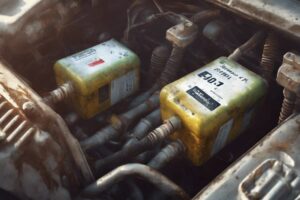When your muffler has a hole, it can lead to engine misfires and reduced fuel efficiency. Breathing in toxic fumes from the hole can cause dizziness, headaches, and fatigue, impacting your health.
Harmful emissions like carbon monoxide are released, contributing to pollution. Signs include increased noise and safety concerns.
Timely repairs are essential to prevent carbon monoxide exposure and failing emissions tests. Acting promptly not only saves money but also maintains your vehicle’s health.
Learn more about the consequences to safeguard your well-being and vehicle efficiency.
Key Points
- Muffler holes emit harmful emissions like carbon monoxide, contributing to environmental pollution.
- Toxic fumes from muffler holes pose health risks, leading to symptoms like dizziness and fatigue.
- Delaying muffler hole repairs can result in engine misfires and reduced fuel efficiency.
- Prompt repairs prevent carbon monoxide exposure and ensure compliance with emissions regulations.
- Recognizing signs early helps address muffler holes promptly, avoiding louder noises and higher repair costs.
Impact on Engine Performance

False
Health Risks From Toxic Fumes
Exposure to toxic fumes from a muffler hole while driving can pose serious health risks, including symptoms like dizziness, fatigue, headaches, and breathing difficulties.
Chronic exposure to carbon monoxide and other harmful gases from exhaust leaks can lead to severe medical implications.
Inhaling these noxious fumes released through a muffler hole can make you sick, impacting your overall well-being.
The toxic gases emitted through a muffler hole can result in various health issues, affecting not only your immediate comfort but also your long-term health.
To protect yourself and your passengers, it’s important to address any muffler hole promptly.
Ignoring a muffler hole can expose you to dangerous levels of toxic emissions, increasing the risk of developing health problems. Regular muffler inspections are essential to prevent sickness caused by inhaling these harmful fumes.
Immediate repair of a muffler hole is necessary to avoid the health risks associated with toxic emissions. Prioritizing the maintenance and repair of your vehicle’s muffler can help safeguard your health and well-being on the road.
Environmental Consequences

Indirectly harming the environment, a muffler hole releases harmful emissions like carbon monoxide into the surroundings.
These emissions contribute to environmental pollution, increasing the levels of noxious fumes that escape through the hole.
The carbon monoxide emitted from a muffler hole not only pollutes the air but also plays a significant role in global warming.
Wildlife and ecosystems can be negatively impacted by the toxic gases released through the muffler hole, affecting their health and habitats.
To mitigate these environmental consequences, it’s important to address muffler holes promptly through proper maintenance and repairs.
Also, practicing pollution control measures such as reducing vehicle idling and ensuring regular vehicle inspections can help minimize the environmental impact of muffler holes.
How Can a Muffler Hole Affect My Car’s Emission System?
A muffler hole can negatively impact your car’s emission system by allowing pollutants to leak out before being properly filtered. Fixing this issue is crucial for enhancing cars emission system and reducing harmful gases released into the environment. Regular maintenance can help prevent further damage to the emission system.
Signs of a Muffler Hole
Experiencing loud noises from your exhaust system could be a clear indicator of a potential muffler hole.
If you notice a sudden increase in noise levels while driving, it’s important to address this issue promptly to prevent further complications.
Here are some signs that may indicate a muffler hole:
- Increased Noise Pollution: A muffler hole disrupts the sound-dampening function, leading to louder exhaust noises that contribute to noise pollution in your surroundings.
- Safety Concerns: A loud exhaust system can attract unwanted attention, potentially leading to being pulled over by the police. Ensuring your vehicle meets noise regulations is vital for your safety.
- Vehicle Inspection Consequences: During inspections, a muffler hole can result in your vehicle failing emission tests or inspections, leading to legal consequences.
- Risk of Delay: Ignoring a muffler hole can escalate the issue, causing the hole to expand and creating even louder noises, potentially leading to more significant repair costs.
Being aware of these signs can help you address a potential muffler hole promptly, ensuring your safety and compliance with regulations.
Importance of Timely Repairs

Addressing a muffler hole promptly is crucial to guarantee your vehicle’s safety and compliance with regulations. Timely repairs prevent carbon monoxide exposure, reducing associated health risks.
By promptly fixing a muffler hole, you secure compliance with emissions regulations, contributing to a cleaner environment.
Delaying repairs can result in engine misfires and decreased fuel efficiency, impacting your vehicle’s performance.
Then, addressing the issue promptly through preventative maintenance measures can help maintain your vehicle’s overall health and prevent further damage.
By taking action early, you not only save money by avoiding more extensive repairs in the future but also ensure that your vehicle operates at its best.
As an Amazon Associate we earn from qualifying purchases.










